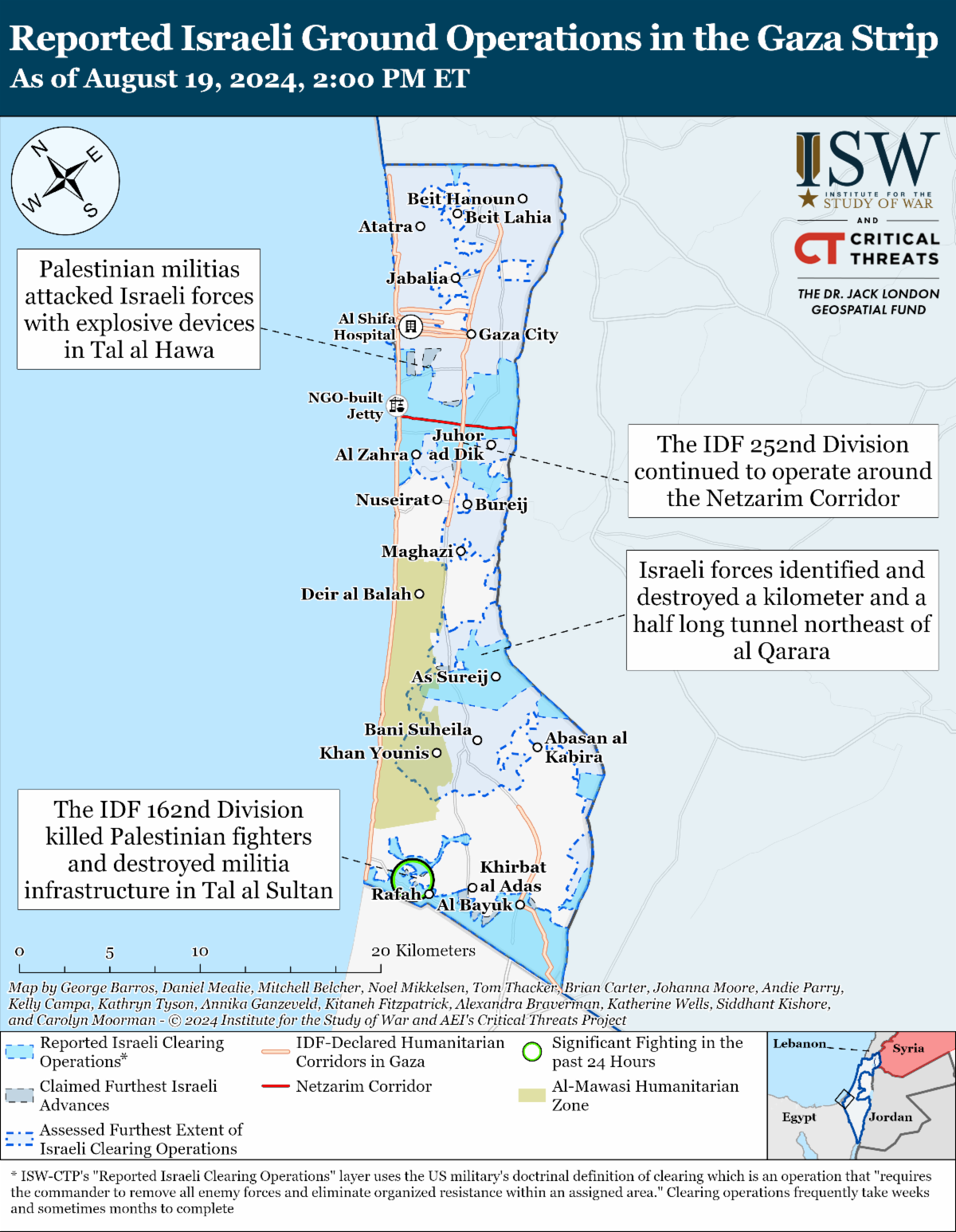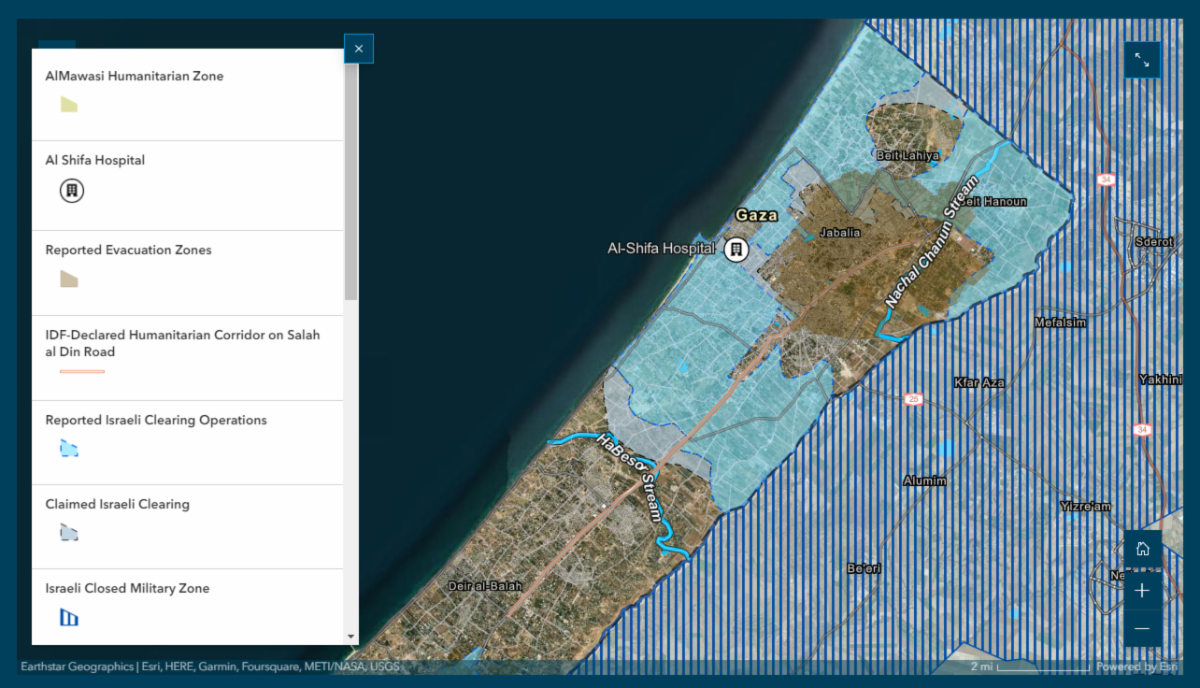The United States, Israel, and international mediators plan to continue ceasefire talks despite Hamas’ rejection of the latest ceasefire-hostage proposal. US Secretary of State Anthony Blinken met with Israeli Prime Minister Benjamin Netanyahu, Israeli President Isaac Herzog, and Israeli Defense Minister Yoav Gallant on August 19 to discuss the ceasefire-hostage deal and the prevention of a regional war. Blinken told reporters before meeting with Israeli President Isaac Herzog that the current ceasefire-hostage talks could be the last chance to achieve a ceasefire. An Israeli official told The Times of Israel that Netanyahu said during the meeting that he will send his top negotiators to this week’s ceasefire summit in Cairo. An anonymous US official said that the Biden administration still expects a resumption of talks from the key negotiating partners later this week. Hamas, however, rejected the ceasefire-hostage proposal produced in the most recent round of talks in Doha and continues to support the July 2024 ceasefire-hostage proposal. Several senior Hamas officials similarly indicated to international media that there are significant obstacles in the ceasefire-hostage negotiations, despite US optimism about the chances of striking a deal.
An unspecified source “familiar with the talks” told a Lebanese news outlet that Egypt agreed not to set a timeline for an Israeli withdrawal from the Philadelphi Corridor during talks in Cairo. An Israeli delegation traveled to Cairo on August 17 to discuss security along the Philadelphi Corridor and opening the Rafah crossing. Al Akhbar reported that Egypt agreed to drop its request for a timeline for Israeli withdrawal from the corridor in return for a reduction of Israeli forces along the border and a complete withdrawal “as soon as possible.” Egypt also reportedly agreed to ensure there are no operational tunnels leading from Egypt into the Gaza Strip.
Maintaining control over the Philadelphi Corridor by the IDF or another entity capable of preventing smuggling and the operation of tunnels will prevent Hamas and other Palestinian militias from rebuilding their capabilities quickly. Controlling the corridor would very likely make it extremely difficult for Hamas to reconstitute itself to the levels it had achieved prior to October 7 in any short period of time. The IDF has severely degraded elements of Hamas. Israeli military action, though not yet destroying or defeating Hamas, has killed many senior and mid-level Hamas commanders and thousands of fighters. These operations have also destroyed a significant amount of Hamas infrastructure. The IDF assesses that Hamas’ rocket stockpiles are dwindling, and there are increasing indications that Hamas’ governance is breaking down. Hamas police have reportedly “disappeared,” and robbery, looting, and extortion has increased. Hamas reconstitution to the same levels the group achieved prior to October 7 would require the group to undertake large-scale smuggling operations under the Philadelphi Corridor, which will be very difficult with competent border security there.
Key Takeaways:
- Iranian Retaliation and Ceasefire Negotiations: The United States, Israel, and international mediators plan to continue ceasefire talks despite Hamas’ rejection of the latest ceasefire-hostage proposal. Iranian officials suggested that Iran will delay its retaliation against Israel for the death of former Hamas head Ismail Haniyeh until after ceasefire negotiations conclude.
- Gaza Strip: An unspecified source “familiar with the [ceasefire] talks” told a Lebanese news outlet that Egypt agreed not to set a timeline for an Israeli withdrawal from the Philadelphi Corridor during talks in Cairo. Control over the Philadelphi Corridor by the IDF or another entity capable of preventing smuggling and the operation of tunnels will prevent Hamas and other Palestinian militias from rebuilding their capabilities quickly. Controlling the corridor would very likely make it extremely difficult for Hamas to reconstitute itself to the levels it had achieved prior to October 7 in any short period of time.
- Terror Attack in Tel Aviv: Hamas claimed its first suicide attack in Israel since 2008. Hamas threatened further suicide attacks, which may indicate a shift in tactics as IDF operations destroy Hamas rocket supplies and limit Hamas’ ability to conduct rocket attacks.
- Iranian Presidential Cabinet Formation: Iranian ministerial nominees outlined their agendas to Parliament on August 18 and 19. The nominees’ proposed policies are largely consistent with current regime policies.
| 






 [ISW] 러시아 공세 캠페인 평가, 2024년 8월 20일
[ISW] 러시아 공세 캠페인 평가, 2024년 8월 20일
 [ISW] 러시아 공세 캠페인 평가, 2024년 8월 19일
[ISW] 러시아 공세 캠페인 평가, 2024년 8월 19일